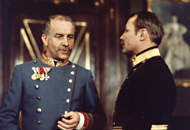The Janik/Toulman passage about Hofmannsthal states that the author subscribed to the Platonic notion that all souls are one (pre-existence), believed his poetry was "an articulation of...impressions and images" (he was an aesthete), and thought, as Ernst Mach did, that "the world consists only of our sensations."
The only issue in the The Man Without Qualities I can think of is related to Mach's need for observation: Ulrich's watching and timing of people must be related to this philosophy.
With this in mind, are the repeated references to eyes and mirrors indicating an anxiety about the unity of souls? There is a point in dealing with the small girl in the greenhouse that "he was careful not to kick her," as if he were understanding the horse and his own death. He is reminded when he sees the horse of the "distorted face of an ugly poor man" in his father's shop when he was young - and notes its association with "the smell of sweet and warm shelled almonds" (shades of a madeleine here). The man's dejection is his happiness in that faraway memory, but now he seems to have a precognition that he will be robbed and die in a miserable place.
Is his continual recognition of everyone and everything around him as interconnected the refutation of Mach's view of the world? Is he saying that his sensations have tricked him and failed to prepare him for death?



No comments:
Post a Comment